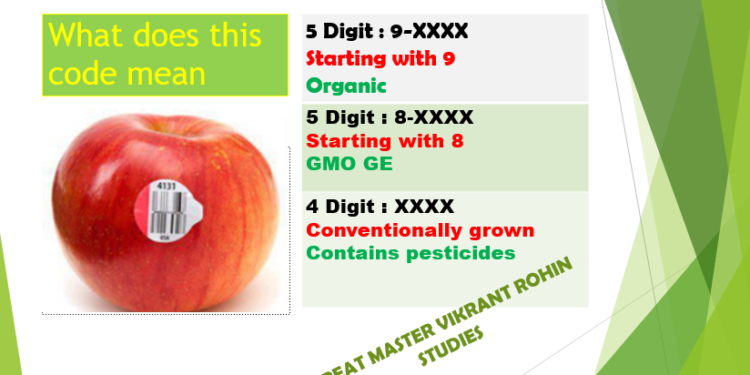- Author: GREAT MASTER VIKRANT ROHIN
- Date: MAY 3, 2023
What Do The Labels On Fruit Mean?
Have you ever wondered what all those different numbered labels on fruit actually mean? Do they serve a purpose other than making it easier for cashiers to ring you up?
Fruits, vegetables, herbs, and nuts are all coded. However, only fruits are labeled, and that label informs the consumer about how the fruit was grown.
Labels On Fruit Are Divided Into 3 Distinct Categories:
- Conventional
- Genetically modified
- Organic

Do you know those little stickers that you can find on fruits and vegetables? Price look-up codes (PLU codes) contain numbers that cashiers use to ring you up. However, you can also use them to ensure that you are getting what you paid for. Here are some things to look for:
For Example:
A 4-digit code – means your fruit was conventionally raised. If you don’t see a label with 5 digits it is safe to assume your fruit has been grown with pesticides and chemicals in nutrient-depleted soil.If your fruit or vegetable was made with conventional farming techniques, then you’ll find a four-digit code that starts with a three or a four.
A 5-digit code (starting with the number 8) – means your fruit has been genetically modified. It has been grown with pesticides already built in and has been modified. A five-digit code starting with eight means that the item is genetically modified. You’re unlikely to see this at your grocery store, according to the consumers’ index, because widely sold genetically modified foods are versions of corn, soybeans, canola, cotton, papaya, and squash. So not that orange or bunch of broccoli you’re eyeing. Also, labeling food as genetically modified is not mandatory.
A 5-digit code (starting with the number 9) – means your fruit is certified organic. A five-digit code beginning with nine means you’re about to purchase organic produce. If you cannot buy locally, choose NUMBER 9 for Organic.
MEAT AND POTATOES:
Buy your fruit locally if at all possible at your local farmers’ markets. If it is during the off-season, organic would be my next best choice. Remember, in order to be certified USDA(Or any local agency, country wise.) organic, the farmer has to jump through hoops and go through years of testing the soil BEFORE he can grow anything on his land.
Your local farmer may choose not to certify himself organic due to cost reasons but still be an organic farmer according to the way he grows his fruits and veggies.
And nowadays, these stickers are redundant because people make them at home and stick them on things.



